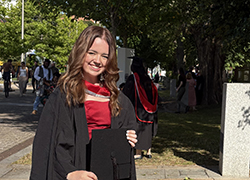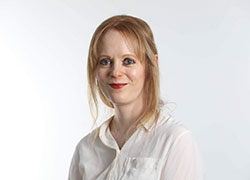Course overview
Accredited Foundation year Work placement
School of Arts & Creative Industries
See what it's like to study at our School of Arts & Creative Industries.
As a journalism student you learn practical and professional skills, growing your confidence to produce journalistic content suitable for TV, radio, magazines, print and social media and bringing your stories to life. You develop your editorial judgement and presentation skills by assembling bulletins, feature and news packages for our unique platform TUXtra. This course has been developed in collaboration with industry, ensuring you graduate ready to compete for your dream job, or continue onto postgraduate study.
You learn how to shoot and edit video and audio, produce news packages to deadlines, research and interview, create campaigns, project manage and engage with audiences on social media. Develop your practice in a safe and supportive environment, working mainly in our bespoke multimedia newsroom, TV and radio studios. You learn to master all of the latest digital storytelling tools for social media and websites including how to harness AI as a journalist.
You can undertake a short-term on campus placement with Teesside Online – part of Reach PLC, one of the largest media companies in the UK. This provides you with real-world experience and industry contacts and enables you to cultivate new skills and a deeper understanding of the industry and its working practices, all while improving your career prospects.
We celebrate your successes big and small throughout your course, our annual Journalism Awards are supported by local and national media professionals, offering you the chance to network with crucial industry connections.
Top reasons to study journalism at Teesside University:
- Industry relationships: take advantage of our long-standing, established relationships with BBC, Newsquest, Reach PLC and Middlesbrough Football Club. Benefit from supportive voices, specialist expertise, shared wisdom, new ideas, a helping hand or a friendly catch-up, establishing critical relationships that propel you into your creative career.
- Practitioner-informed teaching: the teaching team are experienced journalism practitioners, having worked for local and national organisations across print, broadcast and online journalism. They coach you to find and grow your creative voice.
- Get creative: our course and campus are powered by Adobe and Apple. We’re Europe’s first Adobe Creative Campus and the only Apple-accredited University, equipping you with the digital tools and resources to hone your creative journalistic skills.
- Get published: become a practising journalist and publish your stories through TUXtra. Our facilities include two television studios, a radio station and a multimedia newsroom.
- Nationally recognised: The course is accredited by the National Council for the Training of Journalists, one of the best routes into journalism. Our survey data speaks for itself:
- 90% of BA (Hons) Journalism students go on to work and/or study 15 months after the course (Graduate Outcomes Survey 2020-21, tees.ac.uk/source).
- 94.4% of media studies students agreed that staff were good at explaining things. (National Student Survey 2024, tees.ac.uk/source)
Creative UK
 Take advantage of our Creative UK membership and help futureproof your career, with networking events, a resource hub to support professional development, and bespoke workshops in partnership with industry leaders and mentors. Sign up for free student membership to get opportunities, events and newsletters sent directly to your inbox.
Take advantage of our Creative UK membership and help futureproof your career, with networking events, a resource hub to support professional development, and bespoke workshops in partnership with industry leaders and mentors. Sign up for free student membership to get opportunities, events and newsletters sent directly to your inbox.
Course details
Course structure
Year 1 core modules
Enhance your skills in team-working, communication, project management and negotiation. You collaborate with a group of your course mates to produce a small-scale creative project in response to a subject-specific brief.
This is a 20-credit module.
Current Issues in Journalism and Media
Enhancing your understanding of how the media operates globally and nationally, you study the structures and characteristics of journalism practice around the world. You explore the effect of UK structures and systems of government and other public institutions on the practice of professional journalists. Learn how to research, write and produce content for radio, television and digital platforms.
This is a 40-credit module.
Introduction to the Creative Industries
With many opportunities in the creative industries sector, learn how to start on your career path while developing vital employability skills such as networking and digital presence. Understand the structure of the sector and the interdisciplinary relationships between art, design and media. Discover how the sector operates locally, nationally and globally – debating the role of policy and the importance of sustainability.
This is a 20-credit module.
Journalism: Principles and Practice (News and Sport)
You are introduced to the core journalistic skills of news and sports reporting, and study story gathering techniques in the digital landscape. Develop different styles of writing, interviewing and research, as well as video and audio production skills. Explore ways to cultivate and develop contacts, effectively utilising sources in the gathering, communication and dissemination of news and sport stories. You also gain an essential grounding in media law to produce legally and ethically sound content.
This is a 40-credit module.
Year 2 core modules
Develop critical thinking and analysis skills, exploring contemporary issues and debates related to the creative industries. You research a specific area or development within your chosen subject – this may be technical, economic, ethical, legal, cultural, sociological, or a combination. You draw on appropriate academic and industry sources to contextualise your research. You present your topic and initial research within taught sessions, providing an opportunity for peer and tutor feedback.
This is a 20-credit module.
Digital Storytelling (Sport, News and Public Relations)
Explore media, public relations and communication theories, and how social media is a powerful platform to reach large audiences. You find and analyse data, and learn how to visualise that information before putting it to the test during a series of simulated live news and sporting events. Learn how to produce accurate, informative and entertaining sports and news stories to tight deadlines, developing the skills to create compelling multimedia digital content.
This is a 40-credit module.
You develop and explore, in depth, a creative industry-based project in your specialist area of design, art, media, music, photography or illustration - relevant to your future professional practice. While forming a professional portfolio of work, you experience real-world business scenarios and challenges, industry competitions and cross and inter-disciplinary activities. You gain skills in project management, applied research methods and collaborative creative work.
This is a 40-credit module.
Working in the Creative Industries
There are many challenges facing contemporary art, design and media practices. You research the social, political or ecological challenges around us to generate a small-scale project. You develop and reflect on your understanding of enterprise in the context of the creative industries. Contextualise your own professional practice and aspirations through application of critical thinking and problem-solving skills.
This is a 20-credit module.
Optional work placement year
You have the option to spend one year in industry learning and developing your skills. We encourage and support you with applying for a placement, job hunting and networking.
You gain experience favoured by graduate recruiters and develop your technical skillset. You also obtain the transferable skills required in any professional environment, including communication, negotiation, teamwork, leadership, organisation, confidence, self-reliance, problem-solving, being able to work under pressure, and commercial awareness.
Many employers view a placement as a year-long interview, therefore placements are increasingly becoming an essential part of an organisation's pre-selection strategy in their graduate recruitment process. Benefits include:
· improved job prospects
· enhanced employment skills and improved career progression opportunities
· a higher starting salary than your full-time counterparts
· a better degree classification
· a richer CV
· a year's salary before completing your degree
· experience of workplace culture
· the opportunity to design and base your final-year project within a working environment.
If you are unable to secure a work placement with an employer, then you simply continue on a course without the work placement.
Final-year core modules
You produce a self-managed, individual extended piece of independent investigation and/or creative production or portfolio of work. Supervised by an academic member of staff, you take responsibility for the planning and execution of the work, including the consideration of associated legal, social, ethical and professional issues. You explore in depth a chosen subject area, demonstrating your ability to analyse, synthesise and creatively apply your learning, showing critical and evaluative skills and professional awareness.
This is a 60-credit module.
Plan and implement your departure from education to your first or new career, or to further study. You continue your creative practice, developing a portfolio and/or extended piece of work which reflects you as a creative. You explore discipline-specific employability strategies, and engage and network with industry to develop key connections.
This is a 60-credit module.
Modules offered may vary.
How you learn
A full range of the latest digital resources, software and digital recording equipment supports the newsroom environment. Independent and student-centred learning are encouraged in addition to taught sessions with staff.
Theoretical work is delivered through illustrated lectures and seminars where there is opportunity for collective and lively discussion.
The core learning, teaching and assessment tool for practical journalism is the TUXtra website where you produce real content for a publicly facing platform. You also create your own digital platforms supported by the University an enabling you to develop open source web development skills.
Work created as part of assessment builds a professional portfolio of content, which you are able to take out into industry and show perspective employers.
Our Disability Services team provide an inclusive and empowering learning environment and have specialist staff to support disabled students access any additional tailored resources needed. If you have a specific learning difficulty, mental health condition, autism, sensory impairment, chronic health condition or any other disability please contact a Disability Services as early as possible.
Find out more about our disability services
Find out more about financial support
Find out more about our course related costs
Entry requirements
Entry requirements
Year 1 entry
96-112 points from any combination of recognised Level 3 qualifications. Consideration is also given to students without formal qualifications but with evidence of practical journalism experience at an appropriate level. Applicants may be invited to share a portfolio where applicable to show skills in journalism.
Applicants are invited join us on campus for an Offer holder day, enabling you to see our journalism facilities, gain valuable feedback on your portfolio from our academic team, meet staff and students and learn more about studying at Teesside University.
English language and maths requirement
Normally GCSE English language at grade C, or 4 under the new grading system. Alternative equivalent qualifications may be considered.
Non-EU international students who need a student visa to study in the UK should check our web pages on UKVI-compliant English language requirements. The University also provides pre-sessional English language courses to help you meet the English language requirements.
Helping you meet the entry requirements
We may be able to help you meet the requirements for admission by offering you the opportunity to study one or more Summer University modules, some of which can be studied by distance learning.
Alternative degree with integrated foundation year
If you are unable to achieve the minimum admission requirements for Year 1 entry you could, subject to eligibility, join one of our degree courses with an integrated foundation year.
Direct entry to later years
If you have previously studied at higher education level (for example, a foundation degree, HNC, HND or one or more years at degree level at another institution) you may request direct entry to Year 2 or year 3 of this degree.
Mature applicants
We welcome applications from mature students (aged over 21) who can demonstrate, through portfolio/written work and relevant experience, that they have developed cognitive and technical skills through their life experiences.
For general information please see our overview of entry requirements.
International applicants can find out what qualifications they need by visiting Your Country.
You can gain considerable knowledge from work, volunteering and life. Under recognition of prior learning (RPL) you may be awarded credit for this which can be credited towards the course you want to study.
Find out more about RPL
Employability
Career opportunities
Graduates from this course have secured successful careers with BBC, ITN News, Sky Sports News, Reach PLC and Newsquest.
Information for international applicants
Qualifications
International applicants - find out what qualifications you need by selecting your country below.
Select your country:
Useful information
Visit our international pages for useful information for non-UK students and applicants.














 BA (Hons) Journalism
BA (Hons) Journalism BA (Hons) Journalism
BA (Hons) Journalism  BA (Hons) Journalism
BA (Hons) Journalism Teesside University student joins elite team of environmental storytellers
Teesside University student joins elite team of environmental storytellers  Ella secures exclusive front page news ahead of Teesside University graduation
Ella secures exclusive front page news ahead of Teesside University graduation Industry support for future journalists’ study journey
Industry support for future journalists’ study journey